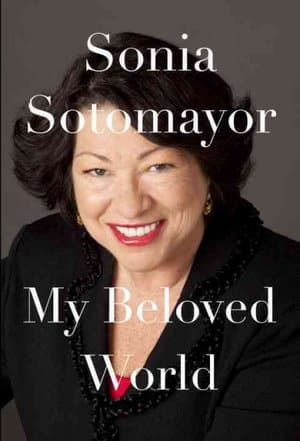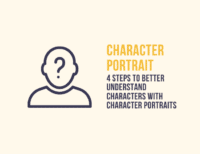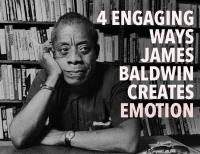Let’s talk about motivations. I love character motivations. When an author has a good grasp on them, the story ultimately leads to a conclusion that is inevitable (but hopefully also surprising).
Recently I read My Beloved World, the memoir of the first Latino and third female Supreme Court Justice, Sonia Sotomayor. One of the major takeaways I drew from the book was the role her diabetes diagnosis appears to have played her ultimate success—a motivation I found both fascinating and surprising.
The experience made me realize that memoirs and autobiographies or even television interviews are great ways to understand why people do the things they do, and why people are the way they are.
Memoirs Are About Real People (and Therefore Real Motivations)
A memoir or interview tells the story about real person and describes events that really take place. Something in this person’s life made it extraordinary and memoirs try to explain how it happened. But what decisions did the subject make that others would not have? What led them down this path of great achievement or great tragedy (or both)?
I’ll never forget Oprah’s interview with Lance Armstrong a few years back. He talked about everything from the doping to the cancer. On the one hand, he was so ambitious and driven that it led him to take performance-enhancing drugs and lie about it (with incredible conviction I might add) for a long time. On the other hand, when the doctors told him he had a fifty percent chance to live, that same drive and belief in himself not only played a role in his recovery, but enabled him to inspire others to do the same through his book.
As a character, Lance is as interesting as anything any of us can make up. As controversial as he is, let’s face it—his life was extraordinary, and what better way to find inspiration?
Next time you pick up a memoir or listen to an incredible life story, see if you can figure out why the subject made the decisions that he made. What motivations were behind them? How did they make their fate inevitable?
Memoirs Provide Opportunities to Practice
Memoirs, et. al are explicit about some motivations in a person’s life, but not all. As writers, we need to go beyond what they tell us, and discern what the stories are showing us. Is there a motivation driving the subject that they don’t even realize is influencing them?
When I read Sotomayor’s memoir, I concluded that it was diabetes that gave her the qualities that enabled her to become one of the most powerful people in the world. She was diagnosed at a young age and during a time when the chances of survival were much lower than they are today. She had to give insulin shots to herself from childhood.
But the process made her disciplined. The reality that she could die young drove her to give her life purpose. And the fact that she was suffering from a disease steered her away from temptations of drugs that plagued her low-income Bronx neighborhood.
Others might disagree that diabetes was a primary motivation behind Sotomayor. In real life we’re influenced by multiple factors; however, when telling a story, writers must pick a primary motivation to serve as a guiding force or theme. Memoirs provide an interesting opportunity for you as the reader to think about those influences that are less obvious yet equally impactful.
How about you? Do you want to know how to write a memoir? Check out our complete guide, Write a Great Memoir: How to Start (and Actually Finish) Your First Draft.
Whose life story fascinates you?PRACTICE
Pick a person with an extraordinary life. Write an obvious motivation behind their choices. Now take fifteen minutes to do some research or watch an interview—what other influences shaped him or her?








I agree and I really like memoirs as well. I just recently finished “The Beautiful Struggle” by Ta-Nehisi Coates. Its great!
Etienne, I apologize for being uninformed in this area, but I have not heard of Ta-Nehisi Coates. Can you tell me a little about the “Beautiful Struggle”? Was Ta-Nehisi a freedom fighter?
He is a journalist – currently senior editor at the Atlantic. http://www.theatlantic.com/ta-nehisi-coates/
Silly me, I took the word “Struggle” in the title to be literal. Thank you for the link.
The unbreakable Doron Navon
Japan, 1968.- The nest of so many martial arts is very protective with its treasure. And Ninjutsu was one of some milenial culture saved only by locals, except when Doron Navon landed in this Asian island.
A strong man with curly long hair and a mustache went to the dojo that he heard so much. Weapons, secret techniques, black clothes and cover faces. So many legends and he wanted to know more.
But there was a problem. He was from Israel. All the Hatsumi sensei’s pupils were from Japan.
Like another challenge in his martial arts career, that includes judo and krav maga, Doron Navon spoke with Hatsumi sensei. “No chance”, maybe the ninja master said. He is a few words person.
Navon came back the next day. Hatsumi decided to show him a technique. Asked his higher grade pupil to control Doron. And there it was. The israeli walked out of the dojo with a broken arm.
But, the next day he was there.
Same routine: Hatsumi asked his higher grade pupil to show him another technique. This time, Doron was near to blackout.
And this routine happened for weeks, maybe even months, before Hatsumi sensei opened his arms to welcome him.
In 1974, Doron Navon went back to Israel, where he found the first Bujinkan Budo Taijutsu school outside of Japan.
Thanks to Doron, today there’s ninjutsu in every continent, and we enjoy such a fascinanting martial arts full of beautiful lessons, techniques and brotherhood.
*********************
Even the story is truth, I couldn’t find so many details about Mr. Navon’s life. However, I admire a lot his sacrifice to understand this beautiful martial art and share it to the world. And of course, Hatsumi sensei is a wonderful character full of many stories as well.
Terrific! His persistence in the face exclusion is inspiring and he was sorely tested.
Inspiring. Persistence. Two words that I like to highlight about your comment. Those words are part of the base of the martial arts pupils. I’m very happy that you like it! thanks for the comment
Wow, Doron Navon had a dream and a purpose. Nothing would stop him, not humiliation, not great physical pain and danger. Too bad not much is known about him. Thank you for sharing this.
In deed, dear Avril. He has one of many interesting stories in the martial arts world. Maybe someday I will search more about him and write an entire work! I’m gladd you like it. Thanks for the feedback!
This blog is timely. I’m currently researching Donald Trump and his book The Art of the Deal is next on my list. This is for my Uncle character (yet to be named) in my novel who comes from a wealthy family of real estate developers in Micronesia and is descended from Micronesian royalty. He has plans to develop land in Hawaii. Interestingly, and one of the great things about writing, as I research for my character, I learn some truths for myself.
Donald Trump’s obvious motivation is money. Money is the ultimate barter for power. However, further research shows him to be more complex, of course.
He was raised with an enormous ego and confidence. He really believes in himself and his destiny to be the best, and loves the hard work it takes to get him there. In fact, one of his sacrifices is family. Two prior marriages have failed largely due to him putting work before wife.
He is passionate about what he does. He enjoys a difficult project, the bigger the better, and then loves working with the details to make it happen. He thrives on what a new project can teach him.
He is jazzed by being told something can’t be done. It only challenges him more. He enjoys proving people wrong. He’s one of those people that figures more pressure creates diamonds.
He thrives on the accolades of a job well done and is motivated by seeing his name, Trump, adorning large development projects throughout the world. He has enormous pride and ego.
My favorite choice for motivation for Trump is he wanted to exceed his father’s success and to make his father proud. He was raised by a rich developer and worked for his father for 5 years. He is constantly quoting his father, who encouraged his son’s confidence. Even though his father is dead, with every project, Trump feels his father looking over his work and waits to hear his words of praise.
I’m not really a fan of Trump, but I have to admire his can-do attitude.
Good choose for a character. Trump could be easily the bad guy of a movie, on the other hand he could be transform in the hero, being motivated by his father. His unbalance between family and work is a very interesting part of his story. Thanks for sharing
Characters like Trump are complex. He’s worshipped in some circles, especially where the cult of money and celebrity thrive. His traits could be shaped into good or bad. I’m choosing bad. 🙂
The more you share about your novel, the more interesting it looks! keep it going
Appreciate your encouragement! It’s a tricky story and I pray I’m equal to the task. 🙂
Dawn, I agree Trump is a fascinating and unique person, and most of us can learn a lot by understanding his background and drive. He is like another person I like to read about, Robert Kiyosaki, who writes the “Rich Dad, Poor Dad” financial advice books. His ethics often dismay me, yet he has a point of view and strong motivating personal factors that are highly evolved beyond the average person’s (just like Trump). I think it is just another irony of life, that the people I might learn the most from are frequently people I would not like to spend time with personally.
Yep, all you say is why he’s great reference for my villain. 🙂
Lance Armstrong was an icon to me and many members of my family for years. Two of my brothers and I are cyclists, and he was our hero. When he was winning the Tour de France every year, and long before the serious allegations of doping became public, I read his first memoir, “It’s Not About The Bike: My Journey Back To Life.” This was his story of learning he had cycling potential as a kid, and turning pro as an adult, only to have all that cut short by a diagnosis of Stage Four Brain Cancer, when he was still a very young man.
The type of cancer in his brain was the most malignant strain, and doctors gave him less than 1% chance to survive. Although the book does talk about how he got into pro cycling, the main story is about his battle with his cancer, his closeness to his mother, and his eventual survival and return to racing form. Before and after reading this book, I would have said that his primary motivation was to win, to show no weakness to any opponent, even cancer, and to be tough and take any punishment to accomplish success.
I would have said that he was motivated by focus, determination, and a passion for life. After the news stories and other cyclists ratted him out, and his eventual confession, I reconsidered his motivations, and I kept going back to one passage I remembered from that book.
I do believe all the stuff I previously said about his motivation was primarily true up until the time he was diagnosed. After that, I believe his perspective took a finer point, and perhaps a morally ambiguous turn. I kept remembering that, near the end of his book, he talks about finding himself and remaking himself and his life as a cancer survivor.
This is paraphrasing, because I don’t recall the exact wording. He talks about how he was left with a big question. After spending years fighting an enemy, after battling every day for your very survival, after suffering, pain, surgeries, chemotherapies, years of hospitalization; how does one return to “normal” daily life? How does one even know what that is anymore?
This is when I think he experienced a subtle, yet critical shift in his motivation and ethics. He had to return to “normal” life. He had to decide what that would be. He went back to bicycle racing, and competing in the Tour de France, the biggest bike race of them all. But what is the Tour de France, compared to cancer? What are long-shot odds in a bike race, versus being told you have less than 1% chance in life?
The doctors and other experts were wrong about Lance Armstrong. He beat their odds. He beat the deadliest, most ravaging cancer out there. He beat chemotherapy and radiation. He beat debilitation, and being cut up. In the end, he even beat God or Mother Nature, or science, however your minds wraps itself around these circumstances.
So he goes back to racing, with that same drive to win and succeed, but now, how does he feel about “rules”? He’s beaten all the “rules”. He prevailed and lived, in spite of all the people in authority who wrote him off. When he went back to racing, had he slipped into a new way of seeing the world, where his goals are what he strives for, and no one gets in his way? I do strongly suspect his real motivation was that he now was a “free agent” in the universe of cause/effect, right/wrong, should be/could be/will be. He alone determined his fate, and he did not pay attention to limitations others tried to put on him.
Knowing his story of victory over cancer, I still respect and admire that part of him. Knowing that much of his earnings went to his Livestrong Cancer Foundation, I respect and admire that. I do respect and admire him for finally admitting his wrongdoing, and appearing on Oprah to come clean to millions of people in their homes. I think I understand how he made that horrendous decision to dope, which is cheating. It is not ok, I am not excusing it, yet I do feel I better understand his situation, and have empathy for how he fell into a way of thinking that served him well in one situation, and was his downfall in the other.
What a great character to write about. For me, Lance Armstrong is very similar to Walter White, and how he went from saint to hell in a blink. And of course all the consequences for people like you, that took his example.
I cannot stop imagine how other cancer fighters were touch by the awful news.
But, however, he wrote one of the must brilliant pages in the history of the humanity, beyond the sports.
I compare him with Oscar Pistorious. Another admirable athlete who finish his career suddenly because a paraonia attack.
Thanks for sharing!
There are crisis points in our lives which cause us to question the value of whatever lines in the sand are drawn before us. Morals, laws, and cultural standards are all fair game. These are tough choices and not always clear cut. Every one of us can look back on our lives and wonder at our decisions. Thanks for the thought provoking share.